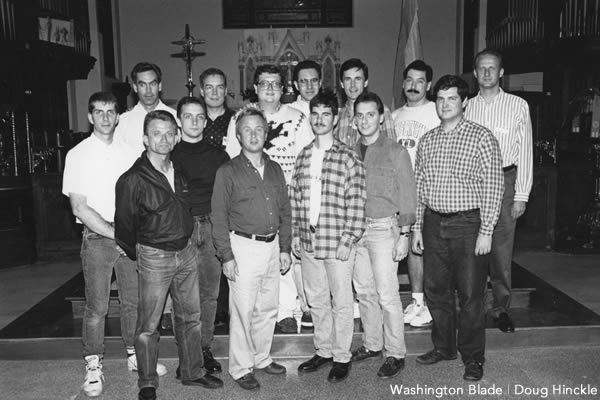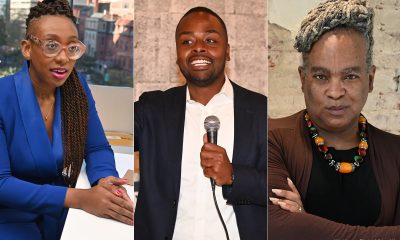Arts & Entertainment
Faith of our fathers
40-year-old gay Catholic group defies Vatican yet seeks communion
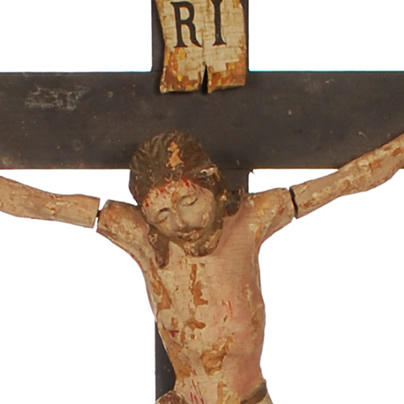
All the mainline Christian denominations by now have gay subgroups that have formed and many in the U.S. — Episcopalians, United Methodists and others — can point to huge strides they’ve made over the last several decades in persuading their hierarchies to acknowledge their presence.
Dignity/Washington, the largest chapter of the LGBT Roman Catholic group DignityUSA, has made so little progress making Vatican teaching less gay-condemning, the group, in many ways, has moved on to other goals it considers more realistic and achievable. The lone victories its members can count on that front are being invited indoors for a 1978 rainstorm during a weekend-long prayer vigil they held at the National Conference of Catholic Bishops at its former headquarters on Massachusetts Avenue (it didn’t foster a long-term dialogue) and a wave from current Pope Benedict XVI (Joseph Ratzinger) in the summer of 2010 (accompanying soon-to-be Cardinal Donald Wuerl did not follow suit).
If anything, the Vatican has become more anti-gay over the years. Though several regional parishes had long allowed Dignity groups to meet on their property, in 1986 Ratzinger, writing as the Vatican’s official keeper of church morality, issued a letter stating that gays and lesbians are “intrinsically disordered” and that gay organizations were no longer allowed the use of church property. It’s only gotten worse in recent years — in January, Pope Benedict condemned same-sex marriage efforts and called gay marriage, in an ironic choice of words, a threat “to human dignity and the future of humanity itself … pride of place goes to the family based on the marriage of a man and woman.”
And it wasn’t just talk — the Roman Catholic Church gave $2 million this year to unsuccessful efforts to outlaw same-sex marriage with November’s ballot initiatives in Maine, Maryland, Minnesota and Washington state, according to the Human Rights Campaign. As pro-LGBT efforts of any kind have taken root elsewhere, the Vatican has increasingly dug in its heels. Official church teaching is that although gays should “be accepted with respect, compassion and sensitivity,” “homosexual acts are intrinsically disordered” and “sexual activity only exists for the purpose of procreation.”
DignityUSA, however, has persevered. The Washington chapter, formed in the fall of 1972 (three years after the national group) and one of 45 active U.S. chapters, has its 40th anniversary events (“Forty and Fabulous on the First”) this weekend. On Saturday evening, a reception and dinner will be held at Clyde’s Restaurant (707 7th St., N.W.) with gay actor/singer Will Gartshore providing entertainment. On Sunday, Sr. Jeannine Gramick (Sisters of Loretto) will give the homily at a special “anniversary Mass.” The group meets weekly for a 6 p.m. Mass at St. Margaret’s Church, an Episcopal parish at 1820 Connecticut Ave., N.W. Details are at dignitywashington.org.
The sheer numbers are daunting. The Roman Catholic Church is the world’s largest Christian church with more than a billion members worldwide. It claims it is the one true church founded by Jesus Christ, that its bishops are the successors of Christ’s apostles and Pope Benedict is the successor to the biblical figure Peter. Though there was no recognized papacy until later centuries, Rome has named an unbroken line of bishops that dates to Peter and the first century. The Archdiocese of Washington did not respond to a request for comment for this article. Dignity/Washington members say relations with it are prickly at best.
“There’s no sense that the local archdiocese has evolved at all,” says Tom Bower, a gay member for almost the whole time the D.C. group has existed, a board member for eight years and co-chair for the anniversary committee. “They absolutely find us quite beyond the pale.”
DignityUSA, a U.S. group as its name implies (similar but unaffiliated gay Catholic groups exist in other countries), has about 6,000 dues-paying members, according to Executive Director Marianne Duddy-Burke, a lesbian, and an operating budget at the national level of about $550,000 though the chapters have their own budgets.
It’s a big weekend for the organization — the Boston chapter is also celebrating its 40th anniversary. San Diego, Chicago and New York also formed chapters in 1972. Dignity/Washington started with a group of about 20 at its first Mass. It moved from twice-monthly to weekly Mass in 1976. Membership and Mass attendance peaked at about 500 and 350 respectively in the late ‘80s. By late 1990, it had become the largest Dignity chapter in the U.S., a feat it maintains to this day, though membership is now about 200 with an average of 90-100 believers attending weekly Dignity Mass in D.C.
It owns its own building in Eastern Market that houses offices and provides space to other LGBT organizations such as Brother Help Thyself and Imperial Court. As with most Dignity chapters, Dignity/Washington prefers to let other churches host its services rather than build its own sanctuary.
“Most of our chapters are kind of hand to mouth,” Duddy-Burke says. “We pay our rent and our basic expenses, we have the weekly bulletins and we underwrite memberships for low-income people and most of our chapters give back to their own communities in some way. … Our model really isn’t based on the institutional model. We focus on the church as more of a community than a building.”
Despite the daunting odds, the group is celebrating. Bower says the group’s mere survival is a reason to be ecstatic.
“The official church would very much like us to disappear,” he says. “We show that you can be gay and Catholic at the same time and happily so and despite the major efforts of a much bigger organization to throw us out. We’re part of a national organization and when the Pope comes out against something gay, we’re able to say, ‘No, that’s wrong.’”
Bob Miailovich, a member for 35 years — someone left a Dignity brochure on his car while he was in a gay bar — agrees.
“This small group of gay men got together back in the early ‘70s — who would have ever envisioned this thing being as big as it is and the ongoing evolution of this group. I mean we’re a small group of sort of churchy guys, but it’s really opened up and I think we’re more broadly attuned to the world at this time and to what faith is all about.”
Despite the political and spiritual cold shoulder, DignityUSA wants to be recognized by the Holy See, the Roman Catholic Church’s central governing body. It’s a key component to the organization’s mission. While many LGBT Christian groups, Catholic and otherwise, have started their own denominations with no interest whatsoever in swaying the Vatican, Dignity, at its very core, feels that it’s important to stay within the church and fight as much as possible. Though many gay Christians cannot fathom wanting anything to do with the Roman Catholic Church after centuries of anti-gay teaching, Dignity members say it’s essential.
“People think, ‘Oh, why do you keep banging your head against the wall?’” Bower says. “That’s why we call it faith. It’s a belief that there is within the larger view of what it means to be Catholic, there’s something there that you just don’t have with other groups.”
Miailovich says despite the anti-gay teachings, he still “find(s) more truth in the Catholic Church than I do in other religions. It’s not perfect and I don’t buy everything at the end of the day but from what I know of other religions and what they teach and believe, I find more truth on the Catholic side than elsewhere else.”
As one might expect considering its size, millions have left the Catholic Church for all kinds of reasons and to varying degrees. Hard though it may be for LGBT people to fathom, there are even strains of Catholicism that have broken off from Rome because they feel the Vatican has gotten too liberal.
The most notorious is the Mexico City-based New Jerusalem, a gated community of about 3,000 that was founded in 1973 as a reaction to the Second Vatican Council of 1962-1965, a hugely influential change in Church teaching that allowed Masses to be said in languages besides Latin among many other things. Several “Traditionalist Catholic” splinter groups also revolted against Vatican II reform, but New Jerusalem is widely regarded as the most extreme — TV, radios, alcohol, makeup and pants for women are forbidden. Residents attend church three times daily, don’t recognize any post-Vatican II Roman church leaders and think Benedict is the anti-Christ. Fundamentalist splinter groups occur in other religions as well — the Fundamentalist Church of Jesus Christ of Latter-day Saints received massive media attention in recent years when its leader was convicted of two felony counts of child sexual assault.
Other groups have broken away on the opposite side of the theological spectrum. The North American Old Catholic Church considers itself a “2,000-year-old church with Apostolic succession” and teaches the “full inclusion of LGBT persons in our religious life, sacraments and clergy.” It also advocates for “the full inclusion of LGBT persons throughout society.” Two gay-welcoming Old Catholic churches were launched in Washington — one in 2011 and another this year— but appear to be inactive. Neither Presiding Bishop Rev. Michael Seneco, who’s gay, nor Rev. Kerolos Saleib of Saint Damien of Molokai Parish responded to multiple requests for comment or had recently updated websites. The churches that hosted them say they’re no longer meeting there. Salieb held a series of Masses at National City Christian Church during the International AIDS Conference this summer but fled the country soon after under mysterious circumstances. Duddy-Burke says many similar groups have come and gone over the years.
Denomination hopping between Episcopalians and Catholics, perhaps the two most stylistically similar denominations in the U.S., has been going on for all kinds of reasons for decades. Many progressive believers left the Catholic Church to find more gay- and women-friendly theology among Episcopalians, the Anglican Church in the U.S. The Catholic Church in recent years has started welcoming a spate of disenfranchised former Episcopalians who left disappointed that the church had become more gay-friendly. Others Episcopalians still, as has been widely reported, left their U.S. dioceses to align with more conservative Anglicans in other countries.
Bower says for him, converting to the Episcopal faith is not feasible.
“There are some basic theological differences between Catholicism and Episcopalianism,” he says. “Even in something as basic as Communion and the notion of transubstantiation. We really believe there is a change in the body and blood. They see it more as a memorial. And there’s a whole historical precedent of difference between the Roman and English churches.”
Others are pushing as far as they can under Vatican leadership and not just on LGBT issues. A lengthy article in the current edition of Rolling Stone magazine tells the stories of Sister Simone Campbell, Sister Margaret Farley and others who are “refusing to back down from the Catholic Church itself up to and including the Pope. On issues ranging from gay rights to abortion, the nuns are either openly contradicting church dogma or quietly undermining it with their silence, choosing instead to embrace a radical notion of missionary work that wouldn’t be out of place at an Occupy Wall Street rally: income inequality, universal health care, corporate responsibility, immigration reform,” and elsewhere reproductive rights. A group called Roman Catholic Womenpriests includes former nuns, ordains women as priests and holds women-led Masses.
Campbell, who didn’t immediately respond to a Blade interview request, told Rolling Stone, the same anti-LGBT beliefs are equally as harmful to women in the exclusively male-led Vatican.
“You’ve got to realize that any crowd that took 350 years to figure out Galileo might be right is not noted for rapid change,” she told Rolling Stone. “This is about a cultural clash between monarchy, in which the monarch is always right, and democracy where everybody has equal dignity, responsibility and opportunity, women and men. The whole idea that we live in a pluralistic society is news to these guys.”
The combined effect of all this shifting is a diminished Vatican hurt by a range of factors, from those turned off by its increasingly right-leaning teachings to millions lost and incalculable damage incurred by the clergy abuse scandals of recent years. Benedict, at times, has seemed almost cavalier about the loss, advocating for a “smaller, purer” church and saying that a church that seeks “above all to be attractive is already on the wrong path.”
Regardless of one’s political or religious views, the numbers are surprising — a third of those reared Catholic in the U.S. leave the church and, according to a Pew Research Study, 10 percent of all Americans are former Catholics. The losses have been partially offset by the disproportionately high number of immigrants who are Catholic.
Gramick, in a lengthy phone interview this week from her home in Mt. Ranier, Md., says the Roman Catholic “institution is unraveling.” Gramick, who declines to give her sexual orientation, was present at the first meeting to form Dignity/Washington in the cafeteria of the National Shrine of the Immaculate Conception with five others in 1971. She later formed New Ways Ministry, which she calls “a peace and justice center focused solely on the issue of lesbian and gay rights.”
Of the Church’s continual anti-gay teaching, she says it’s “causing a lot of dissonance and alienation among the Catholic community and a lot of Catholics out there in the pews, they’re no longer in the pews. Mass attendance has decreased dramatically in the last 20-30 years and actually what I think we’re seeing is the beginning of the dissolution of the institutional church. The institution is unraveling but the faith of the people is continuing and growing.”
Is it conceivable to imagine a post-Vatican world in another generation or two?
“If you’re talking erasure, I don’t think I’d go that far, but it’s unraveling certainly … it’s getting increasingly frayed and not only at the edges. It’s really closer to the center and it’s coming apart at the seams.”
Dignity Catholics don’t want that. At the most basic level, they believe the Vatican is simply wrong on the traditional view of Christian teaching and homosexuality, though opinions vary as to the reasons.
“We say basically go back and look at the theological arguments presented and they’re false,” Bower says. “We’re not picking and choosing which teachings to abide by. This is what you get when you look at the gospels. There really are no statements about LGBT people the way we think of it today. The type of homosexuality they were referring to was basically idol worship and temple prostitution.”
Having worked on these issues for decades, Gramick says the Vatican’s gay and lesbian theology is “not really based on the Bible.”
“It’s really more based on philosophy and natural law that uses scriptural quotes as backup,” she says. “It doesn’t really use scripture as the basis for its objection. They say homosexuality is unnatural without any acknowledgement that nature changes. What you see with the Vatican is an unwillingness to acknowledge change. If you have a 13th century mind, you would understand their position but with a 21st century mind and the science we’ve discovered, the human person is not what the Vatican thinks a person is. … Psychology has come so far since then. They didn’t know anything about Freud. When they come out with these views of it being a disorder, this is just not an enlightened view of psychology.”
Gramick’s iconoclastic work has not gone unnoticed — she says in the last 11 years, her religious community has received nine letters from the Vatican advising her superiors to have her dismissed from the Sisters of Loretto. The three presidents in that time have backed her, though the Church does play hardball — last month Rev. Roy Bourgeois was “canonically dismissed” for ordaining a woman at a Unitarian church in Kentucky in 2008.
Duddy-Burke says the decades of Vatican opposition have brought both a change of approach from DignityUSA and unexpected advantages.
“I think we’ve actually moved from trying to get acceptance from the Vatican to really leading the rest of the Church into being a more just Church,” she says. “I think we sort of feel like our job now is to hold our leadership accountable for the damage they’ve done and at the same time model a better way of living out the Gospel.”
She says slowly this approach has “caused people to see that the Church not only belongs to the Bishop and the Vatican. All of us who are baptized Catholics own the Church as well as the rites that are part of it. … If people ever caught on it would be like, ‘Wow, you’re governing it, you’re saying who preaches and presides, you decide if you want to use the new Roman Missel or not.’ Because we’ve been so excluded, we’ve had this opportunity to create the Church that we deserve and it’s an opportunity that a lot of Catholics haven’t had.”
Despite the Vatican’s refusal to bend, there’s growing evidence, both anecdotally and in serious research, that its official teachings are out of step with the majority of its laity — a summer poll conducted by the Pew Forum on Religion and Public Life found that 58 percent of Catholics favor same-sex marriage with 33 percent opposed. On matters as far-ranging as whether an unexcused absence from weekly Mass warrants a mortal sin to use of contraception, U.S. Catholics and many of their counterparts in other countries have long been a body of believers who haven’t felt they had to adhere to all church doctrine to stay in the church. Many parishes and clergy — even some who perform Dignity Masses — are quietly gay welcoming. They keep it low key to avoid interference from church leaders, but can sometimes be more welcoming than many would realize. So much so, in some cases, that it’s eaten into Dignity’s roster.
That’s partially why Dignity members say they don’t want to leave the church.
“The church really is the people of God,” Miailovich says. “It’s a horizontal assembly, not some vertical thing where you have the Pope at the top and an triangle going down with everyone else. Out there in the pews, there’s a great deal of support for a more progressive agenda, for women’s ordination, for married priests, you have the nuns on the bus for social justice. Everybody in the church does not believe 100 percent of everything that may be promulgated from on high.”
He also says there’s an “attitude that it’s my church and you can’t take it away from me.”
“I can’t leave what is mine and that leaves you with a sense that some day, somehow, change will be made. You’re right, there are people who’ve said, ‘Why spend a lifetime working with these people, let’s go start our own thing and not worry about what’s left behind.’ But I’m not going to change. This is who I am. This is how I pray and how I worship and here I am. We pray for our church leaders because we feel they need enlightenment.”
Bower agrees.
“We’ve found a peace and reconciliation within ourselves,” he says. “It’s more like a ‘We think we’re right and we’re here if you ever want to talk’-kind of thing. There’s less time today spent trying to articulate and debate all these issues because there’s really nobody to talk to on the other side.”
Despite, the ongoing dissent, Gramick says the occasion is a celebration.
“They’ve had a marvelous ministry here for 40 years ministering to local LGBT Catholics,” she says. “It’s really a time to rejoice.”
Sports
US wins Olympic gold medal in women’s hockey
Team captain Hilary Knight proposed to girlfriend on Wednesday

The U.S. women’s hockey team on Thursday won a gold medal at the Milan Cortina Winter Olympics.
Team USA defeated Canada 2-1 in overtime. The game took place a day after Team USA captain Hilary Knight proposed to her girlfriend, Brittany Bowe, an Olympic speed skater.
Cayla Barnes and Alex Carpenter — Knight’s teammates — are also LGBTQ. They are among the more than 40 openly LGBTQ athletes who are competing in the games.
The Olympics will end on Sunday.
Movies
Radical reframing highlights the ‘Wuthering’ highs and lows of a classic
Emerald Fennell’s cinematic vision elicits strong reactions

If you’re a fan of “Wuthering Heights” — Emily Brontë’s oft-filmed 1847 novel about a doomed romance on the Yorkshire moors — it’s a given you’re going to have opinions about any new adaptation that comes along, but in the case of filmmaker Emerald Fennell’s new cinematic vision of this venerable classic, they’re probably going to be strong ones.
It’s nothing new, really. Brontë’s book has elicited controversy since its first publication, when it sparked outrage among Victorian readers over its tragic tale of thwarted lovers locked into an obsessive quest for revenge against each other, and has continued to shock generations of readers with its depictions of emotional cruelty and violent abuse, its dysfunctional relationships, and its grim portrait of a deeply-embedded class structure which perpetuates misery at every level of the social hierarchy.
It’s no wonder, then, that Fennell’s adaptation — a true “fangirl” appreciation project distinguished by the radical sensibilities which the third-time director brings to the mix — has become a flash point for social commentators whose main exposure to the tale has been flavored by decades of watered-down, romanticized “reinventions,” almost all of which omit large portions of the novel to selectively shape what’s left into a period tearjerker about star-crossed love, often distancing themselves from the raw emotional core of the story by adhering to generic tropes of “gothic romance” and rarely doing justice to the complexity of its characters — or, for that matter, its author’s deeper intentions.
Fennell’s version doesn’t exactly break that pattern; she, too, elides much of the novel’s sprawling plot to focus on the twisted entanglement between Catherine Earnshaw (Margot Robbie), daughter of the now-impoverished master of the titular estate (Martin Clunes), and Heathcliff (Jacob Elordi), a lowborn child of unknown background origin that has been “adopted” by her father as a servant in the household. Both subjected to the whims of the elder Earnshaw’s violent temper, they form a bond of mutual support in childhood which evolves, as they come of age, into something more; yet regardless of her feelings for him, Cathy — whose future status and security are at risk — chooses to marry Edgar Linton (Shazad Latif), the financially secure new owner of a neighboring estate. Heathcliff, devastated by her betrayal, leaves for parts unknown, only to return a few years later with a mysteriously-obtained fortune. Imposing himself into Cathy’s comfortable-but-joyless matrimony, he rekindles their now-forbidden passion and they become entwined in a torrid affair — even as he openly courts Linton’s naive ward Isabella (Alison Oliver) and plots to destroy the entire household from within. One might almost say that these two are the poster couple for the phrase “it’s complicated.” and it’s probably needless to say things don’t go well for anybody involved.
While there is more than enough material in “Wuthering Heights” that might easily be labeled as “problematic” in our contemporary judgments — like the fact that it’s a love story between two childhood friends, essentially raised as siblings, which becomes codependent and poisons every other relationship in their lives — the controversy over Fennell’s version has coalesced less around the content than her casting choices. When the project was announced, she drew criticism over the decision to cast Robbie (who also produced the film) opposite the younger Elordi. In the end, the casting works — though the age gap might be mildly distracting for some, both actors deliver superb performances, and the chemistry they exude soon renders it irrelevant.
Another controversy, however, is less easily dispelled. Though we never learn his true ethnic background, Brontë’s original text describes Heathcliff as having the appearance of “a dark-skinned gipsy” with “black fire” in his eyes; the character has typically been played by distinctly “Anglo” men, and consequently, many modern observers have expressed disappointment (and in some cases, full-blown outrage) over Fennel’s choice to use Elordi instead of putting an actor of color for the part, especially given the contemporary filter which she clearly chose for her interpretation for the novel.
In fact, it’s that modernized perspective — a view of history informed by social criticism, economic politics, feminist insight, and a sexual candor that would have shocked the prim Victorian readers of Brontë’s novel — that turns Fennell’s visually striking adaptation into more than just a comfortably romanticized period costume drama. From her very opening scene — a public hanging in the village where the death throes of the dangling body elicit lurid glee from the eagerly-gathered crowd — she makes it oppressively clear that the 18th-century was not a pleasant time to live; the brutality of the era is a primal force in her vision of the story, from the harrowing abuse that forges its lovers’ codependent bond, to the rigidly maintained class structure that compels even those in the higher echelons — especially women — into a kind of slavery to the system, to the inequities that fuel disloyalty among the vulnerable simply to preserve their own tenuous place in the hierarchy. It’s a battle for survival, if not of the fittest then of the most ruthless.
At the same time, she applies a distinctly 21st-century attitude of “sex-positivity” to evoke the appeal of carnality, not just for its own sake but as a taste of freedom; she even uses it to reframe Heathcliff’s cruel torment of Isabella by implying a consensual dom/sub relationship between them, offering a fragment of agency to a character typically relegated to the role of victim. Most crucially, of course, it permits Fennell to openly depict the sexuality of Cathy and Heathcliff as an experience of transgressive joy — albeit a tormented one — made perhaps even more irresistible (for them and for us) by the sense of rebellion that comes along with it.
Finally, while this “Wuthering Heights” may not have been the one to finally allow Heathcliff’s ambiguous racial identity to come to the forefront, Fennell does employ some “color-blind” casting — Latif is mixed-race (white and Pakistani) and Hong Chau, understated but profound in the crucial role of Nelly, Cathy’s longtime “paid companion,” is of Vietnamese descent — to illuminate the added pressures of being an “other” in a world weighted in favor of sameness.
Does all this contemporary hindsight into the fabric of Brontë’s epic novel make for a quintessential “Wuthering Heights?” Even allowing that such a thing were possible, probably not. While it presents a stylishly crafted and thrillingly cinematic take on this complex classic, richly enhanced by a superb and adventurous cast, it’s not likely to satisfy anyone looking for a faithful rendition, nor does it reveal a new angle from which the “romance” at its center looks anything other than toxic — indeed, it almost fetishizes the dysfunction. Even without the thorny debate around Heathcliff’s racial identity, there’s plenty here to prompt purists and revisionists alike to find fault with Fennell’s approach.
Yet for those looking for a new window into to this perennial classic, and who are comfortable with the radical flourish for which Fennell is already known, it’s an engrossing and intellectually stimulating exploration of this iconic story in a way that exchanges comfortable familiarity for unpredictable chaos — and for cinema fans, that’s more than enough reason to give “Wuthering Heights” a chance.
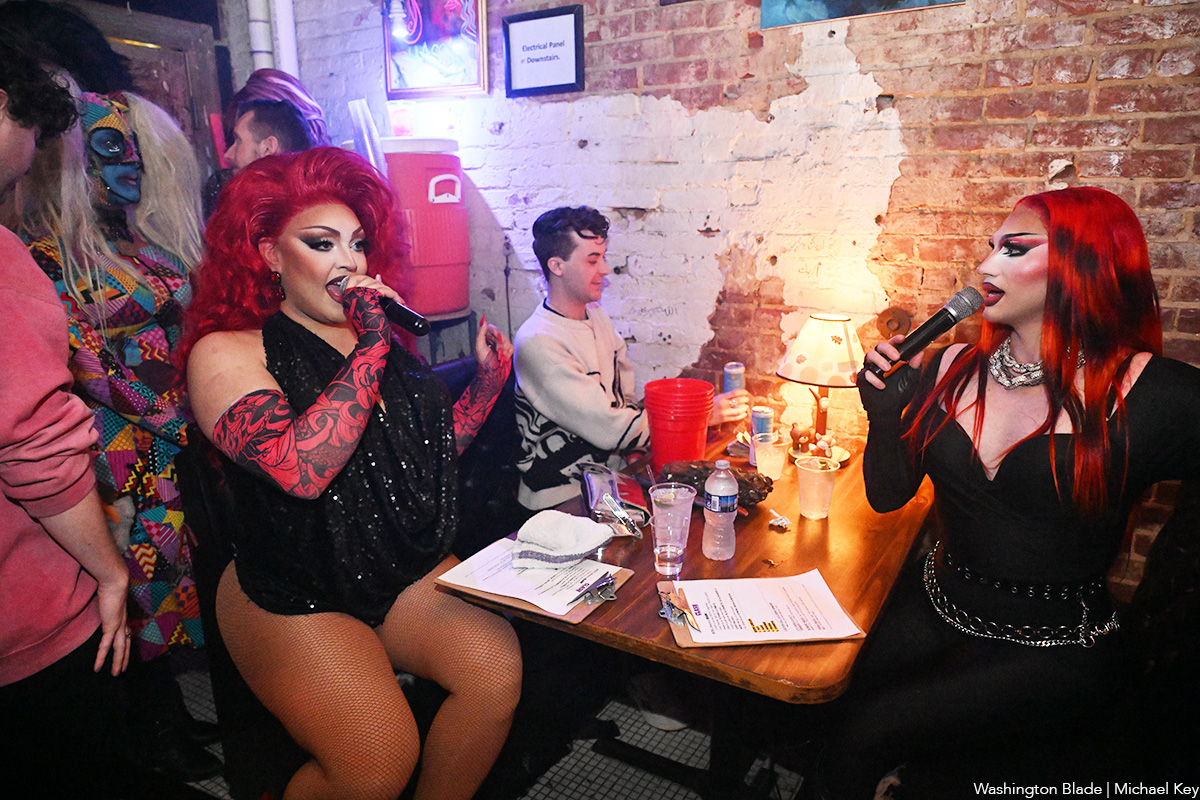
Crimsyn and Tatianna hosted the new weekly drag show Clash at Trade (1410 14th Street, N.W.) on Feb. 14, 2026. Performers included Aave, Crimsyn, Desiree Dik, and Tatianna.
(Washington Blade photos by Michael Key)
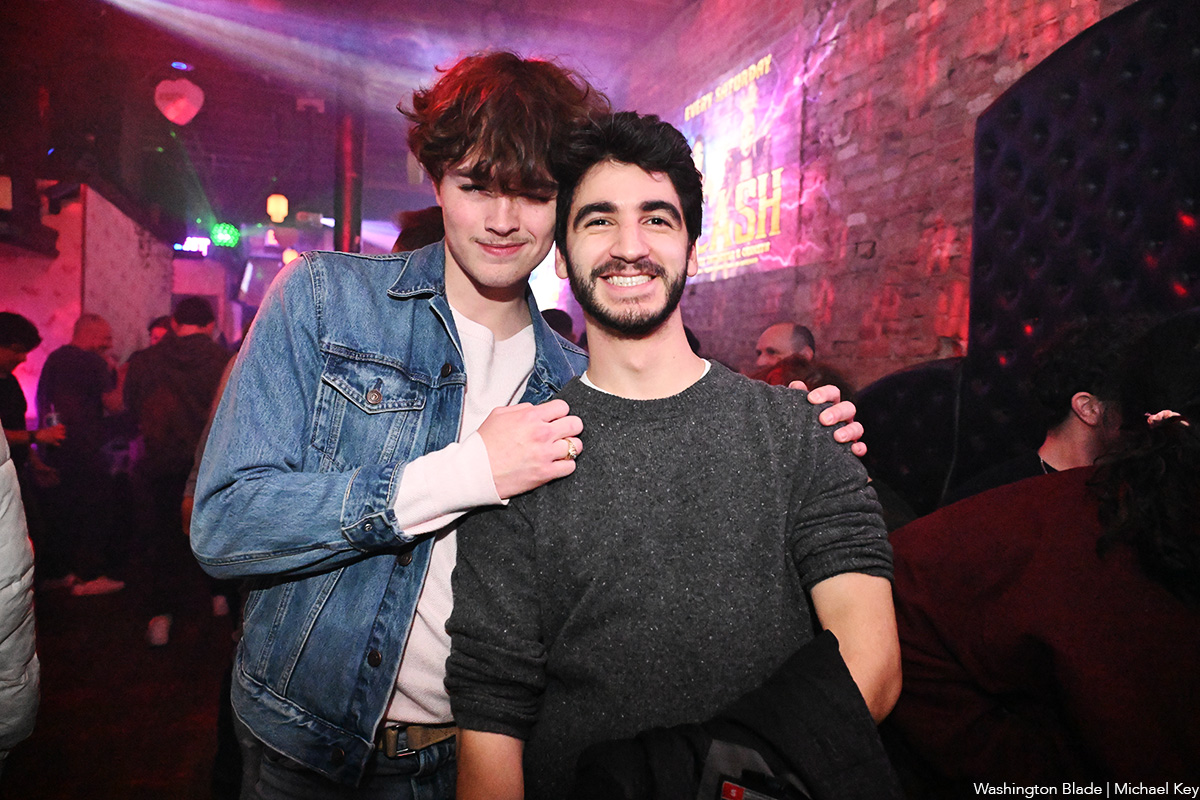
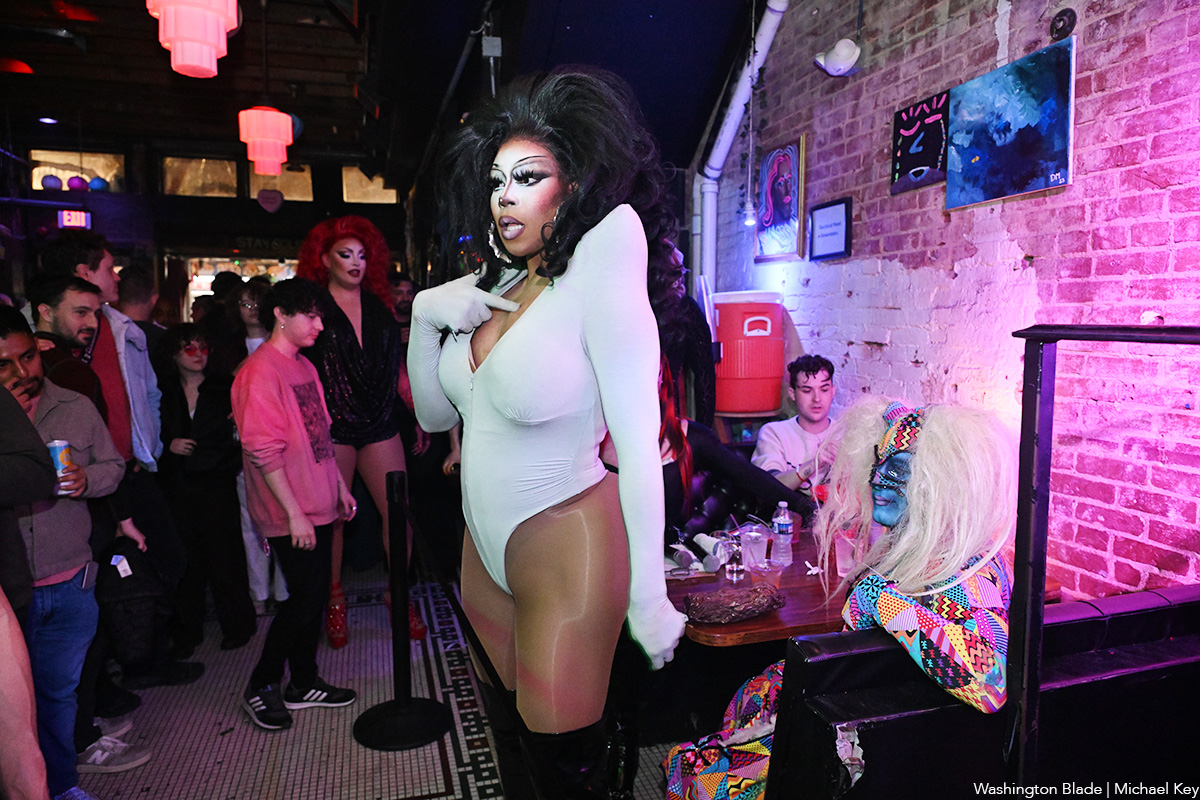
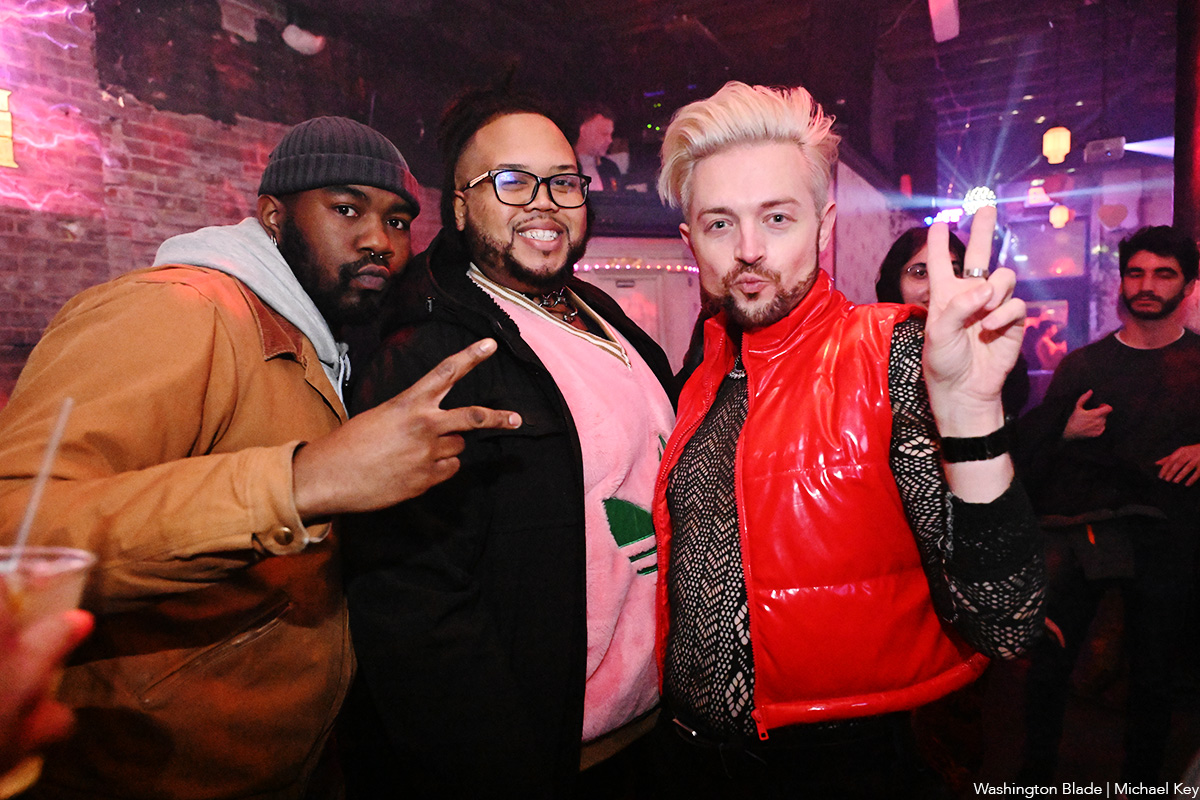
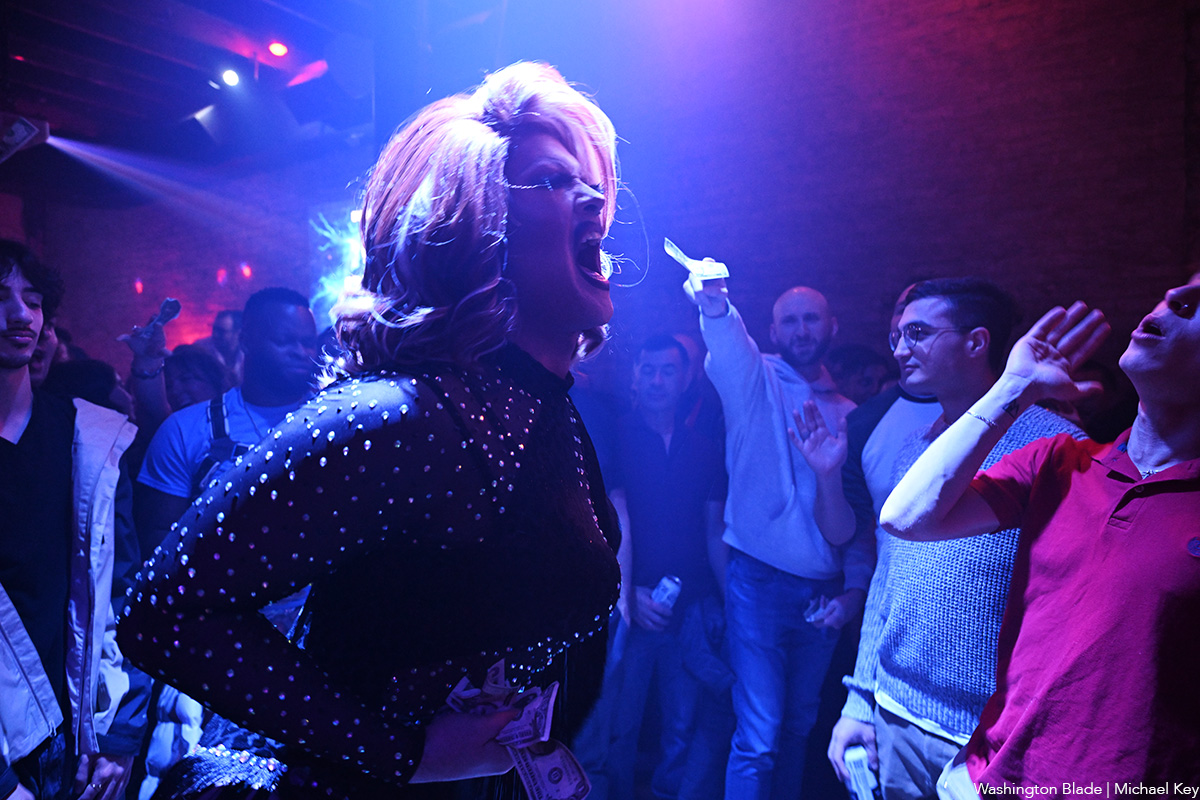
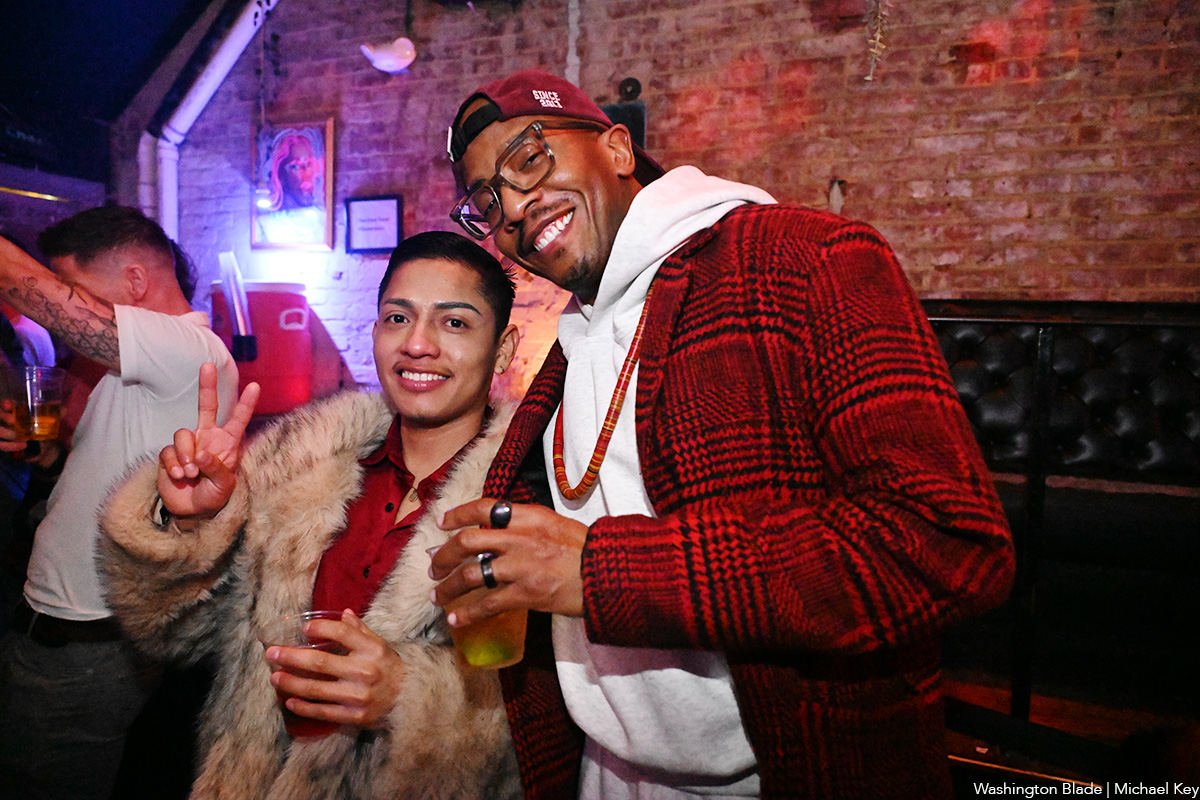
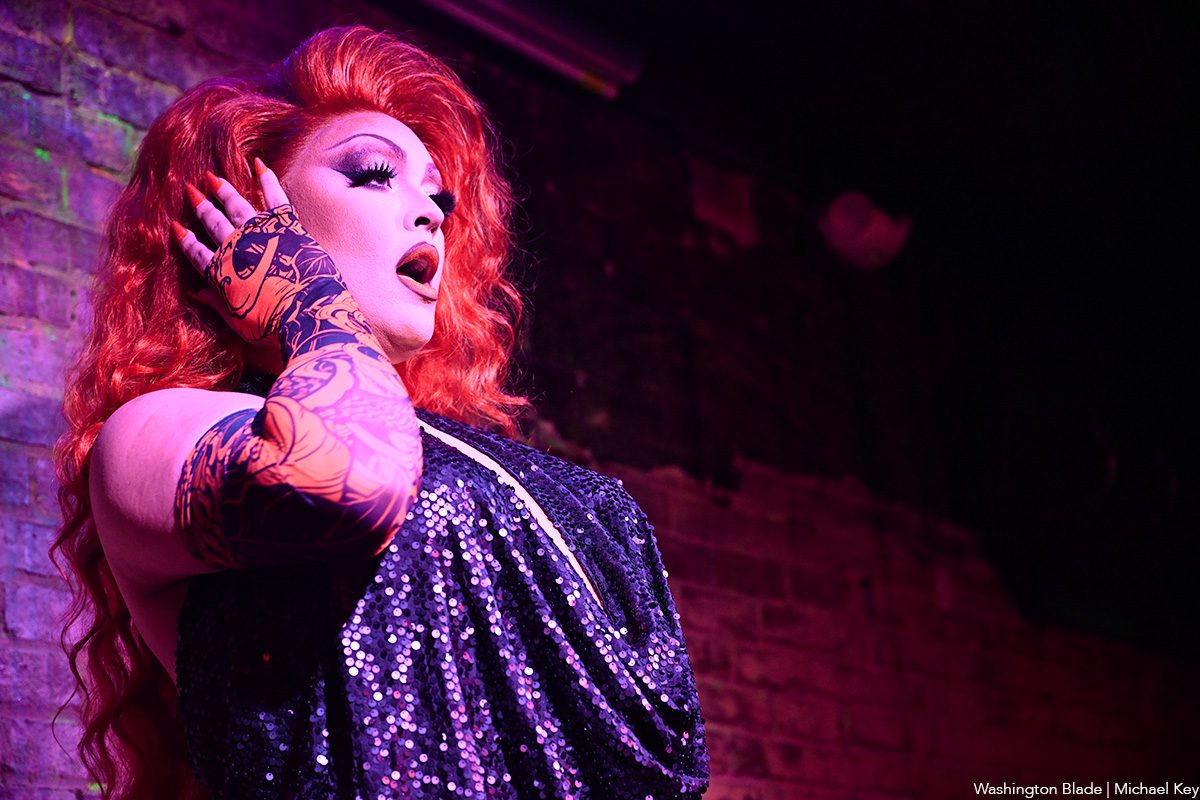
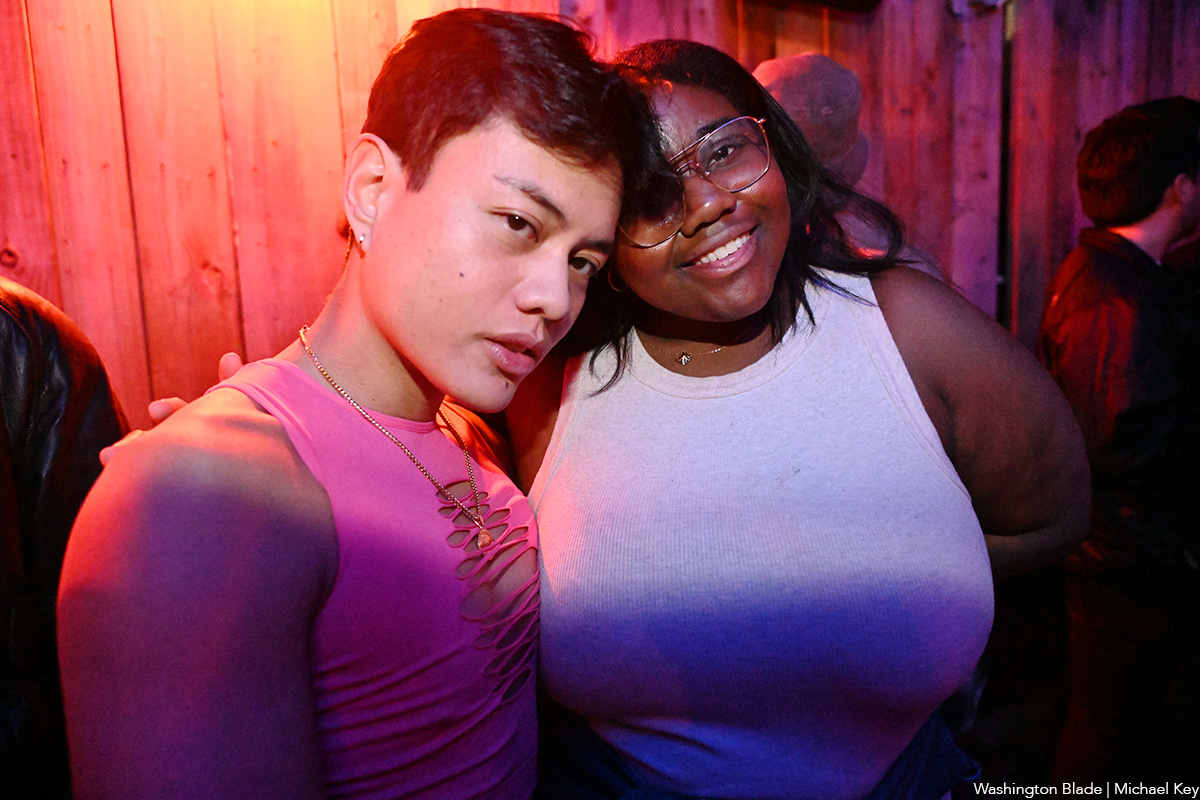
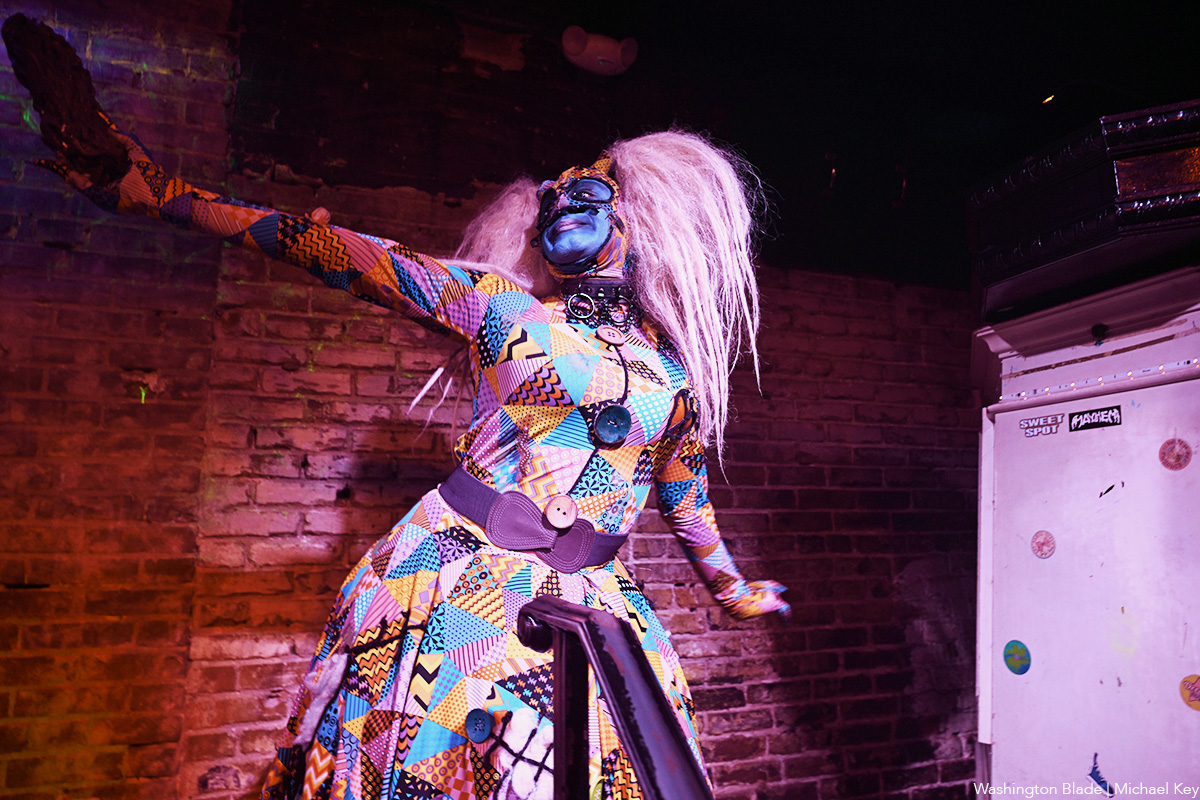
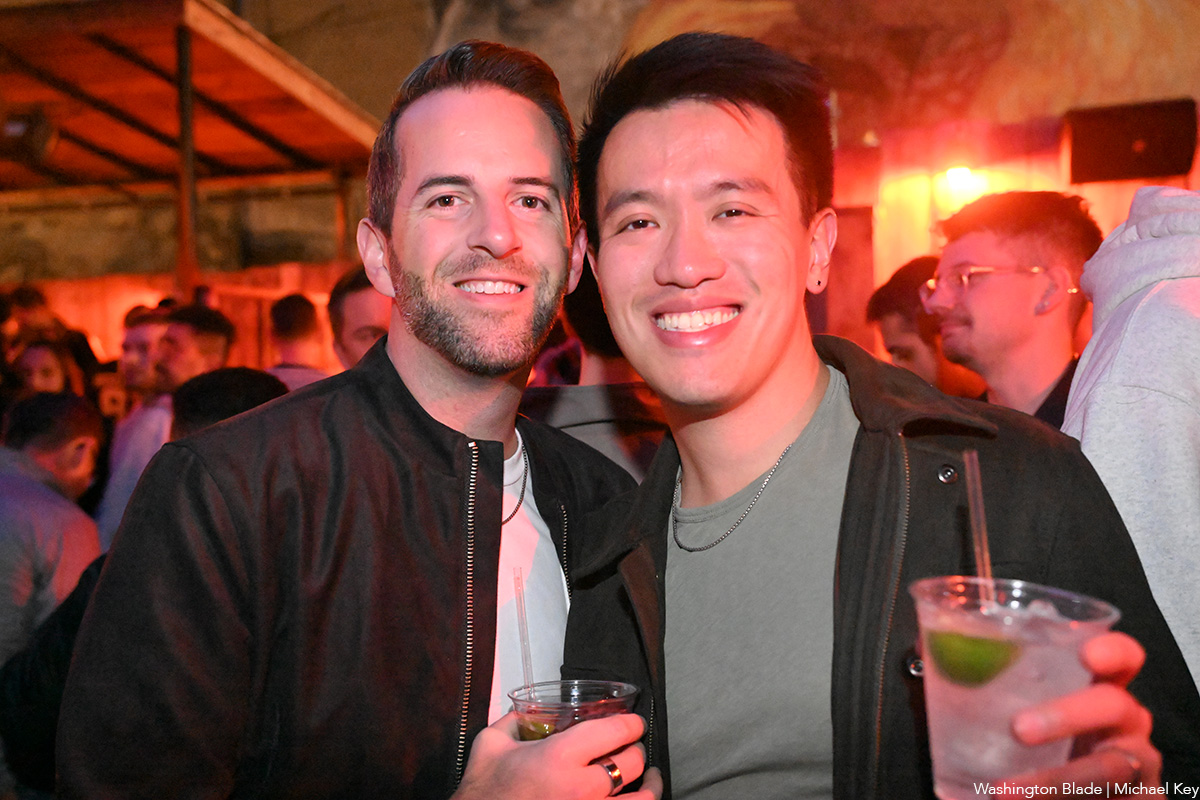
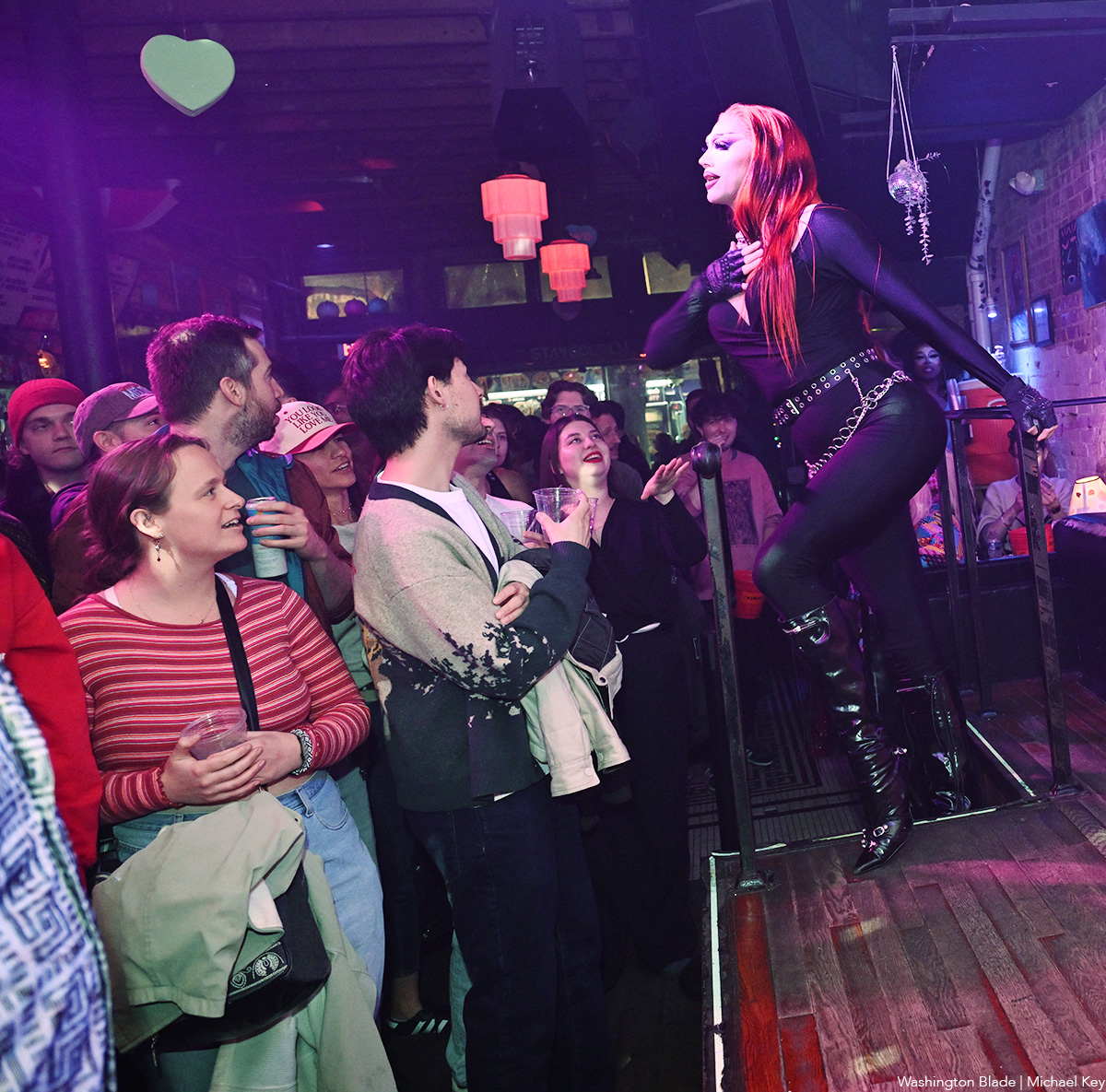
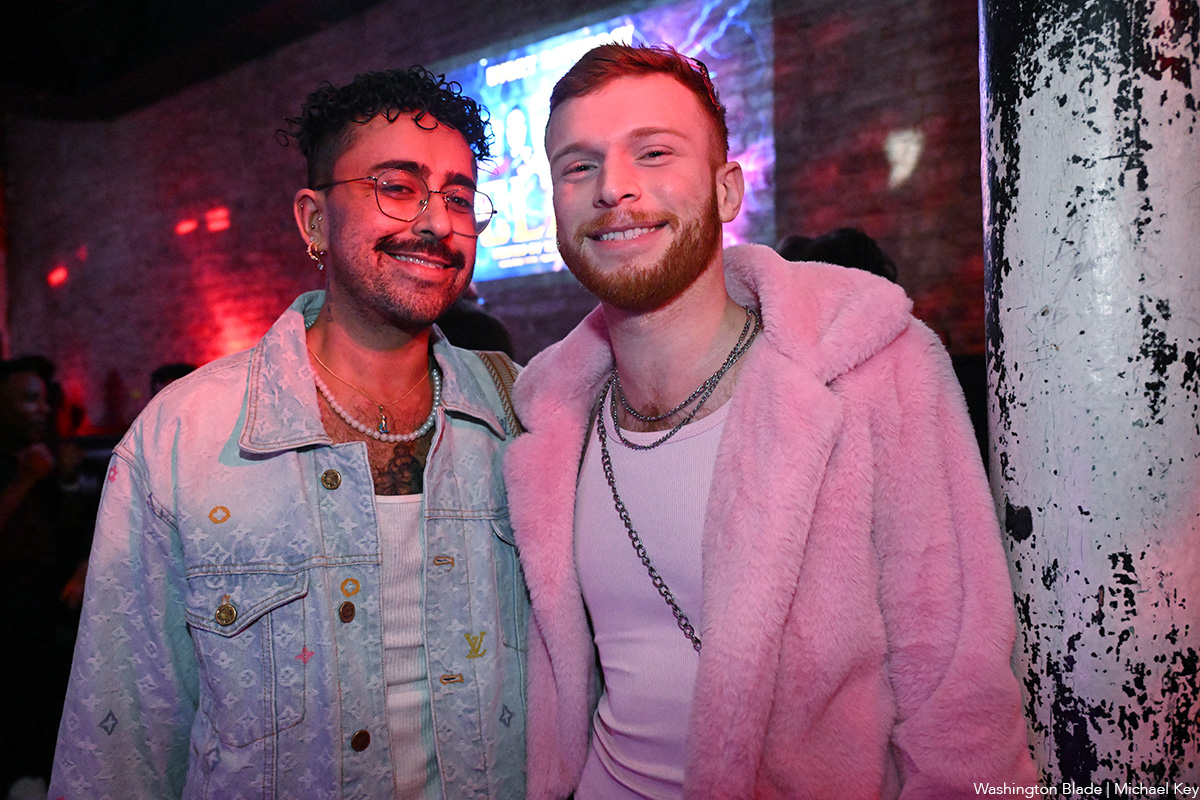
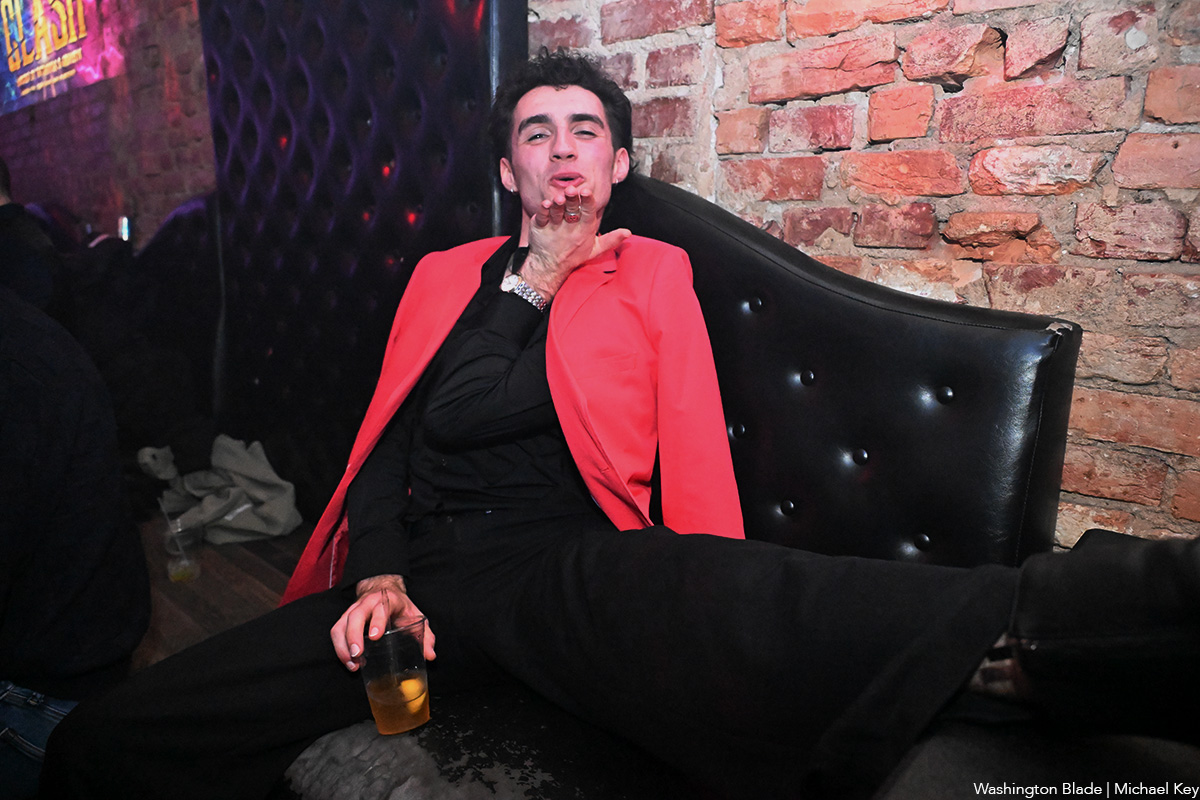
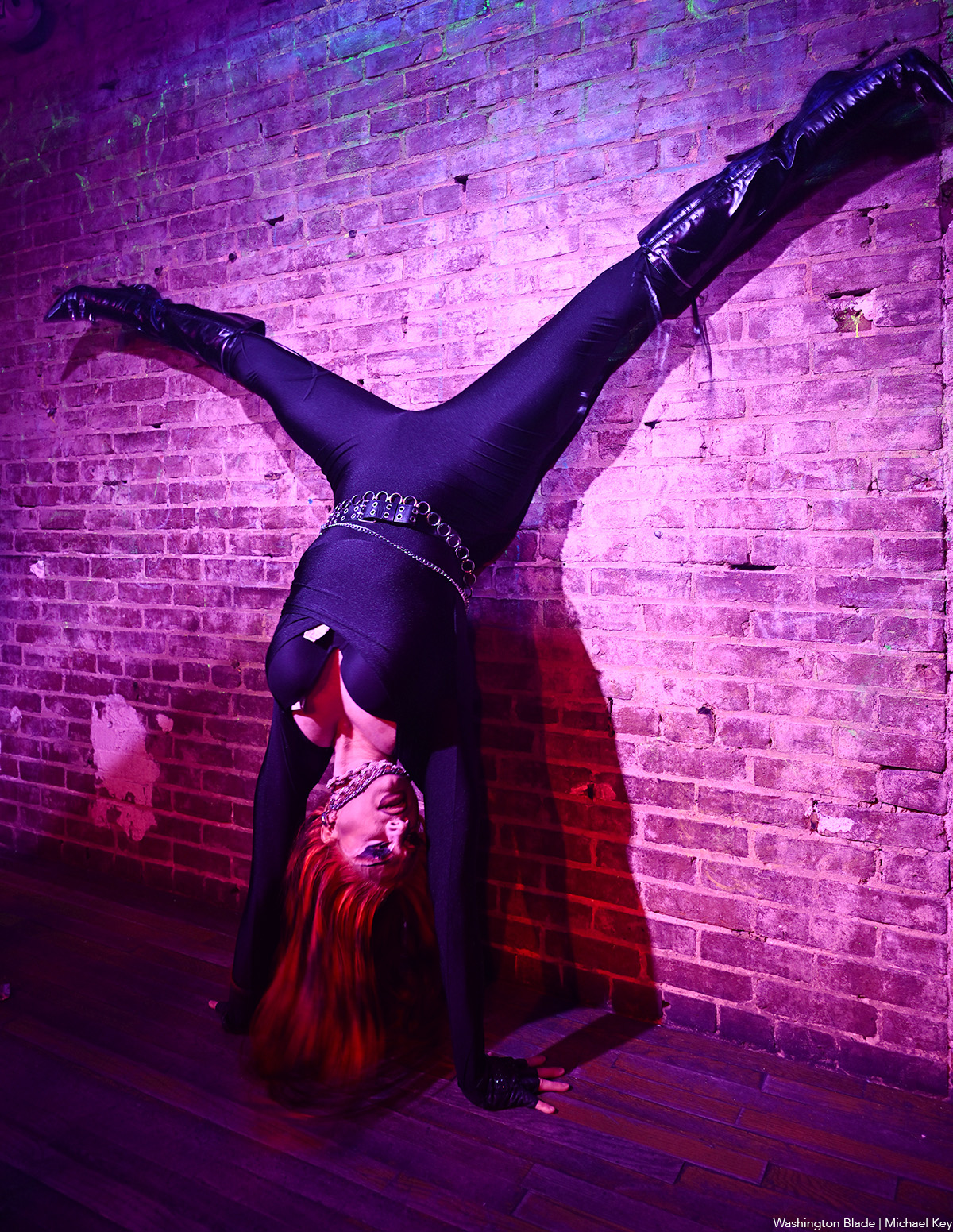
-

 Baltimore4 days ago
Baltimore4 days ago‘Heated Rivalry’ fandom exposes LGBTQ divide in Baltimore
-

 Real Estate4 days ago
Real Estate4 days agoHome is where the heart is
-

 District of Columbia4 days ago
District of Columbia4 days agoDeon Jones speaks about D.C. Department of Corrections bias lawsuit settlement
-

 European Union4 days ago
European Union4 days agoEuropean Parliament resolution backs ‘full recognition of trans women as women’


